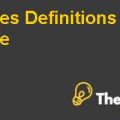
This case suggests the Japanese company could implement IFRS, with particular emphasis on consolidation of accounts. "Hide
by David F. Hawkins, Suraj Srinivasan, Akiko Kanno, Lizzie Gomez Source: HBS 16 pages. Publication Date: 02 December 2010. Prod. #: 111037-PDF-ENG
KANEBO LTD (A)
1. INTRODUCTION:
Kanebo Ltd, a very well known company in cosmetic industry revealed to make Japan’s major fraudulent act. Under the restructuring it was realized by IRCJ that Kanebo is involved in a series of fraudulent accounting policies. It was also discovered that its financial statements had overstated consolidated earnings by 200 billion yen, which was the largest misstatement for a Japanese non-financial institution.
2. PROBLEM STATEMENT:
Following points need to be analyzed:
• The root causes of Kanebo’s fraudulent accounting.
• Japan’s decision to adopt the International Financial Reporting Standards during 2015/2016. Should there be any exception to implementing the full set of IFRS.
• Compare J-GAAP’s present consolidation standards and those of IAS 27. Select most appropriate for Japan.
• View of financial analyst on Kanebo’s case.
• Difference in the Kanebo’s reported 1999-2004 financial statement and Kanebo’s restated 1999-2004 financial statement
• Difference in the reported and restated consolidated financial statements.
• Putting aside fraud is the parent company only financial statements useful for an investor.
3. ANALYSIS/RESULTS:
The root causes of Kanebo’s fraudulent accounting:
There are many causes that led the company to proceed with fraudulent accounting. This started back in 1990’s when the recession majorly affected the financial performance of the company and as a result in 2003 the company owed over 520 billion yen in interest bearing loans, exceeding its assets by 63 billion yen. The huge debt in financial statement caused the company to alter the statements and show high value of the company by hiding the debt at most. He company planned to hide the losses its subsidiaries were bared. They used the consolidated accounting practices in Japan in a wrong way, as in Japan consolidated financial statements were not mandatory and were considered as supplement information to the parent company’s financial statements. Therefore Kanebo eliminated all the loss making subsidiaries from their accounts and made the only-parent financial statement. The company was doing this from many years, as to hide the losses for many years. The company’s president said that the company was well reputed and he wanted to save the company’s reputation that is why he did not revealed this. Kanebo sold the shares of its loss making subsidiaries and there was no accounting standard present to check the sell and buy-back activity of a company just before financial year. Kanebo also overstated the inventory and under-reported the reporting of expenses to increase its consolidation net worth. These acts clearly showed that Kanebo had falsified financial statements with material impact. Now, it was corporate audit’s responsibility to find such happenings and take action upon it. But the corporate audit, ChuoAoyama knew about these internal falsified financial statements, they were quiet for the fact that the audit company did not wanted to loose their major client. Secondly this fraudulent activity was happening since many years, and the audit firm was scared that if they revealed the fact now, there audit firm’s reputation will lost and the whole company had to bare the loss. Some accounting standards were completely wrong in Japan and secondly the audit firm was not strong enough to take a step and do what it is suppose to do. These were the root causes, which led Kanebo to conduct fraud...
This is just a sample partial case solution. Please place the order on the website to order your own originally done case solution













